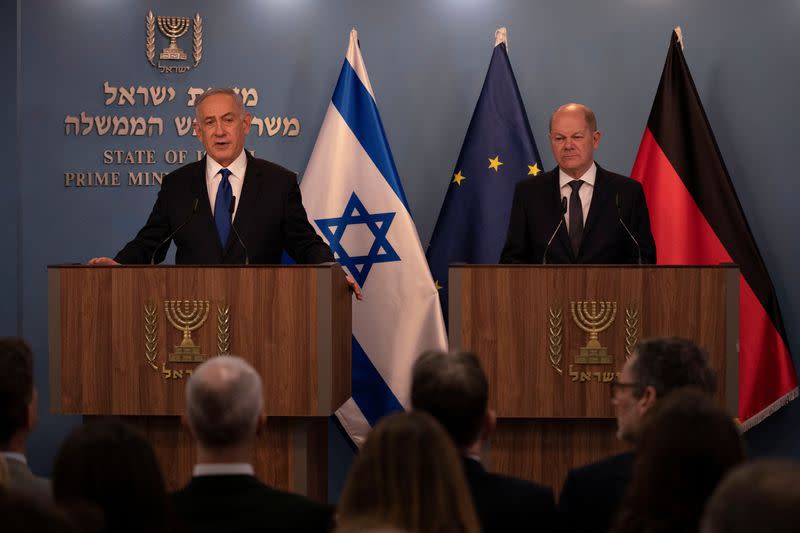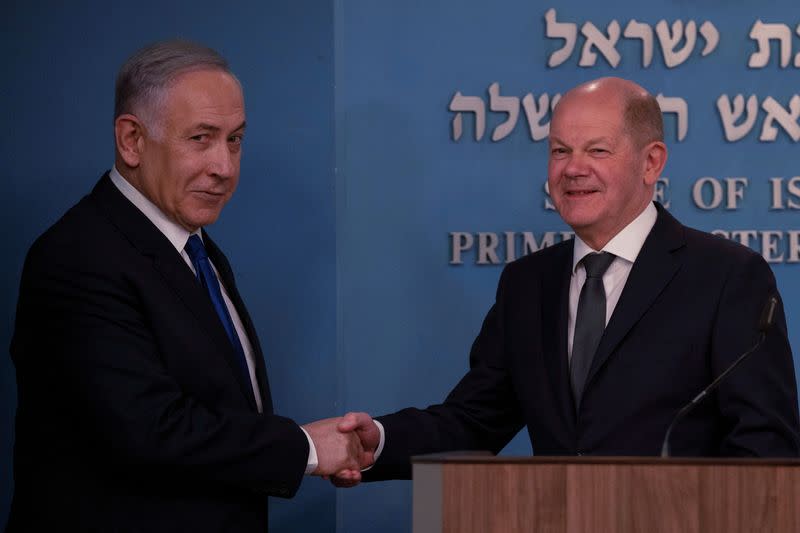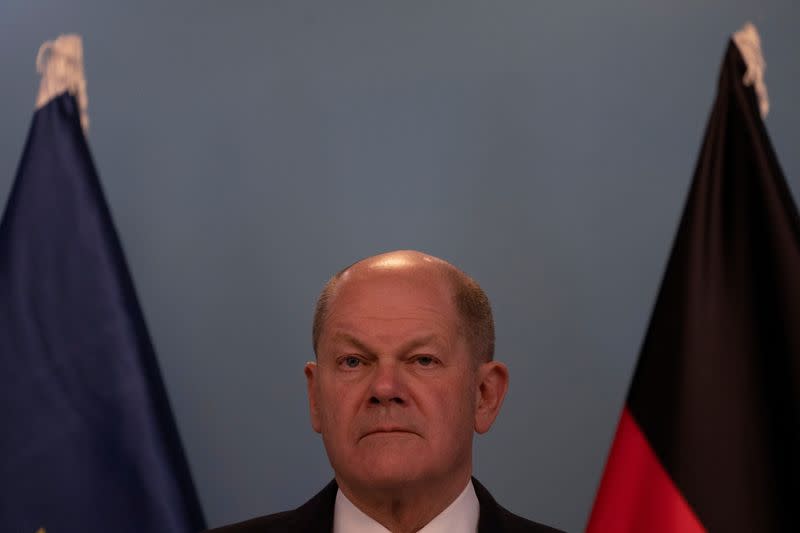Scholz to Netanyahu: cannot stand by as Palestinians risk starvation
- Oops!Something went wrong.Please try again later.
- Oops!Something went wrong.Please try again later.
By Sarah Marsh
JERUSALEM (Reuters) - German Chancellor Olaf Scholz questioned the "terribly high costs" of Israel's offensive on Palestinian Islamist group Hamas in Gaza on Sunday, saying the world could not simply stand by and watch as Palestinians risk starvation in the enclave.
Speaking after talks with Israeli Prime Minister Benjamin Netanyahu in Jerusalem, Scholz said he had shared his concerns about the high number of civilian casualties and insufficient aid reaching Gaza where aid agencies say famine is looming.
While many countries have expressed similar concerns, the warning was unusually stark for the German leader, who has continuously underscored Israel's right to defend itself after Hamas' Oct. 7 assault on the country that killed 1,200 people, according to Israeli tallies.
Germany has been one of Israel's staunchest allies alongside the United States, underlining its duty to stand by the country's side in atonement for its perpetration of the Nazi Holocaust in which 6 million Jews died.
"The more desperate the situation of the people in Gaza becomes, the more this begs the question: No matter how important the goal can it justify such terribly high costs, or are there other ways to achieve your goal?" Scholz said in English at a joint appearance with Netanyahu.
Scholz's trip on Sunday to Jordan and Israel came after Israel on Friday approved a plan to attack the city of Rafah on the southern edge of the shattered Palestinian enclave where more than half of its 2.3 million residents are sheltering after five months of war.
Global allies and critics have urged Netanyahu to hold off attacking Rafah, fearing mass civilian casualties. But Israel says it is one of the last strongholds of Hamas whom it has pledged to eliminate and that residents will be evacuated.
"How should more than 1.5 million people be protected? Where should they go?" Scholz asked. The large number of civilian casualties that would result from a Rafah assault would make regional peace "very difficult", Scholz said earlier in the day after talks with Jordanian King Abdullah in the Jordanian Red Sea port of Aqaba.
Scholz added that he had spoken with Netanyahu about the need for conditions for the distribution of aid to be "urgently and massively improved".
"We cannot stand by and watch Palestinians risk starvation," he said. "That's not us. That is not what we stand for."
TWO-STATE SOLUTION
Sustainable security will not come from "higher walls and deeper ditches" but from a positive perspective for both the Israeli and Palestinian peoples, meaning a two-state solution, said Scholz.
For this the Palestinian Authority needs to be reformed and strengthened, both in terms of personnel and structures, he said.
"Lasting security for future generations of Israeli people lies in a solution with the Palestinians, not against them," he said. "Terror cannot be defeated with military means alone."
Netanyahu responded by saying that an agreement that made Israel look weak would create an unsustainable peace.
Speaking with reporters earlier in the day in the Jordanian Red Sea port of Aqaba, Scholz said it was "very clear we must do everything so the situation does not get worse than it already is."
Scholz did not directly answer a question about whether Germany would react to a large-scale Rafah offensive, for example by restricting German weapons exports to Israel.
Germany is facing growing accusations - including from prominent Jewish residents in Germany - of allowing guilt to blinker its response to Israel's retaliation.
Malaysian Prime Minister Anwar Ibrahim accused Europe during a visit to Berlin last week of being "hypocritical" and selective in its concern for different peoples, overlooking decades of widespread Palestinian suffering.
Israel's air and ground campaign in the enclave has killed more than 31,600 people, say health authorities in Hamas-run Gaza, driven most of the population from their homes and brought them to the brink of famine, according to aid agencies.
(Reporting by Sarah Marsh in Jerusalem; Additional Reporting by Riham Alkousaa in Berlin; Editing by Hugh Lawson and David Holmes)



